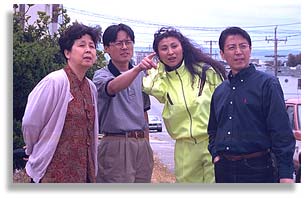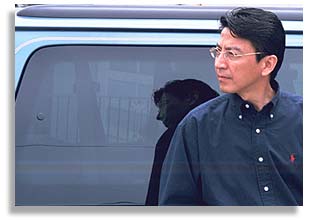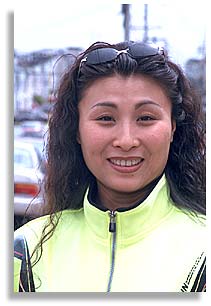|
An interview with Beijing Opera artists
Pan Yong Ling, Li Jin Ping, Li Hong Mei, and Wang Hong Part 1 - "Arts are unlimited. You never stop learning." Interview by Nic Paget-Clarke |
|||||||||||||||||||||||||||||||||||||||||||||
At the time of the interview, Beijing Opera artists Pan Yong Ling, Li Jin Ping and Li Hong Mei were in the United States to perform the premiere presentations of Jon Jang and James Newton's "When Sorrow Turns to Joy - Songlines: The Spiritual Tributary of Paul Robeson and Mei Lanfang" (libretto by Genny Lim). This piece is inspired by the artistic and political legacies of the African American singer/actor/humanitarian Paul Robeson and Chinese operatic star Mei Lanfang. It was commissioned by Cal Performances - University of California at Berkeley and the Walker Art Center in Minneapolis. In Motion Magazine: Li Jin Ping, where are you from and why did you become interested in music?
Li Jin Ping: About 13 years old. In Motion Magazine: What made you think ‘I want to study music’? In Motion Magazine: What other music was around at that time? Wang Hong: There were a lot of performing groups (all of the groups were called “Chairman Mao Thought Ensemble”), modern ensembles for professional musicians and music lovers. People at schools and elsewhere wanted to join these performance groups. This music was broadcast and performed every day. In Motion Magazine: How long did you study at the China Academy of Traditional Opera? Li Jin Ping: I studied Beijing Opera in school for seven years in Beijing. In Motion Magazine: Pan Yong Ling, where were you born and what made you decide to start studying music? Pan Yong Ling: I was born in Shanghai in 1944. When I was a child, I liked all kinds of entertainment and performance like music, dance, singing - all the arts. When I was twelve years old, I attended the China Academy of Traditional Opera in Beijing. All three of us attended this college. I went to the academy in 1956 and graduated in 1962. In Motion Magazine: When you first went to the school did you know music? Pan Yong Ling: At that time I knew nothing but I liked music and by chance I attended the school. In Motion Magazine: By chance? Pan Yong Ling: A thousand people wanted to take the examination for the school but only ten people got a chance to go. In Motion Magazine: So you took the examination? Pan Yong Ling: Yes, and I passed. In Motion Magazine: Li Hong Mei, how about you? Li Hong Mei: I was born in a small town in northeastern China, Jin Zhou City in Liao Ning province. When I was a child, I was greatly affected by my mother who was a famous local opera singer. Because Beijing Opera is one of three famous operas in China, my mother, who had learned local opera, wanted me to learn Beijing Opera.
In Motion Magazine:You moved to Beijing? Li Hong Mei: Yes. In Motion Magazine: What was that like? Li Hong Mei: They have the best teachers and you can learn more things there. It opens your eyes and you can see more famous singers in Beijing. There are more opportunities. Pan Yong Ling: If you have decided to learn Chinese dramatic opera it’s best to start at an early age. If you are too old, it’s too late. In Motion Magazine: Why? Wang Hong: They want young people because some of the training is just like it is for acrobatic performers, the exercise of all the muscles. You have to practice leg movements. (Li Hong Mei, by way of example, while sitting, raises her leg and straightens it, parallel to her body. Everyone laughs.) Wang Hong: I cannot do that. That’s why you have to start young. Pan Yong Ling: Also, we have a large repertoire to learn. Four years is not enough. Li Hong Mei: You have to learn four basic skills: singing, movement, story-telling, acrobatics. Wang Hong: They are saying that to learn Beijing Opera you have to be an all-sides artist. You have to learn everything. In Motion Magazine:How did that effect your childhood, Li Hong Mei? Were you hanging out with the rest of the kids? Li Hong Mei: It’s a very painful life. There are so many exercises. Usually there are a lot of people doing the exercises and everyone is crying. It is a very hard life. Right now, I confess, any harder life is no problem (laughs). In Motion Magazine:Did your family move to Beijing with you? Li Hong Mei: After I graduated from the school my parents moved to Beijing. In Motion Magazine: Wang Hong, what is your background? Wang Hong: I was born in Beijing in 1959. At age nine, just like with Li Jin Ping, everywhere there was Beijing Opera, so, one day, I was being taught Beijing opera in my elementary school and the leader of the children’s art group talked with the principal and asked that I join the ensemble. It was called the Little Flower Ensemble. I was lucky and got a chance to join the group. I learned acrobatics in Beijing Opera. I sung Beijing Opera for two years. Later, because I fell on the ground and hurt my back, my teachers decided I should learn something else. I picked up erhu, the two-stringed instrument. I’ve played that instrument for more than thirty years. That’s how I learned music. In Motion Magazine: How did you come to be in the U.S.? Wang Hong: In 1993, my wife came here, a half year earlier than me. She had a contract with an American company for a touring performance. Then, I was offered an opportunity with an educational Asian company to do some school programs because they knew I could play more than ten different instruments.The first days were very difficult because I couldn’t speak English but I just listened and gradually I could talk more and more. That’s why now I can translate. I’ve been here seven years. In Motion Magazine: Pan Yong Ling, please tell me what is the legacy of Mei Lan Fang to you as a musician and as a Chinese person. Pan Yong Ling: Because Mei Lan Fang was a master Beijing Opera singer on the top level people are very proud of him. He was born in 1884. Beijing Opera has more than two hundred years history and before Mei Lan Fang, in China, there were already master Beijing Opera performers. But, when he became a master Beijing Opera singer he reformed a lot of things.Mei Lan Fang reformed Beijing opera and established many different actors. He changed face makeup and the clothes worn because he thought they should show modern life. He was trying to combine the traditional and the modern. In Motion Magazine: He changed Beijing Opera dress towards the use of more modern clothing? Wang Hong: Yes. In Motion Magazine: Did he do that by example or was he in a position of power to be able to change the way things were run? Pan Yong Ling: When he was twenty years old, he did a lot of touring performance, traveling to different cities. He performed particularly in Shanghai. Also he had relations, such as his uncle and his father who were Beijing Opera singers. His family was popular. Because he was a famous Beijing opera singer he received support from banks and high level writers. China was very poor but he was able to get support from banks. Li Jin Ping: Mei LanFang created the foundation for reform and raised the position of traditional opera. He turned a lot of traditional historical stories into opera. He developed a lot of new works. In Motion Magazine: What time period are we talking about? Pan Yong Ling: About 1910 through the 1920’s Li Hong Mei: When Mei Lanfeng was a child he was very poor, and lived a very hard life. The master teacher told him ‘don’t learn this’ because the older generation masters ‘don’t want to give you the bowl for rice’. That meant they didn’t want him to learn it because it’s a very hard life.Because his family was very poor his training was very different. He had to do performance to sustain his family. At the same time, and during the performance, he learned with the master. His father passed away when he was young so he had to provide for the family. In Motion Magazine: Tell me more about Mei Lan Fang as an artist. Li Hong Mei: In the structure of Beijing Opera there is lot of hand movement, like flowers. Secondly there is movement of the eyes. The eyes are the window into your heart. Pan Yong Ling: When you move your hands, your eyes follow your hands. Thirdly, in the structure there is the movement of the body. The fourth aspect is the presence, the structure of the performance as the whole. Mei LanFang was the best in all aspects of Beijing opera. With some people the hands are good, but the eyes not good. With some people the body is good but other parts not good. Li Hong Mei: Mei LanFang was a master in presenting different kinds of roles. He performed as a young lady, as an old lady, as heroines, as someone born in a poor family, as someone born into a family with high position. China at that time was a feudal country so woman could not perform and Mei LanFang wore makeup and performed as women. In Motion Magazine: Mei Lanfang wrote plays - did he direct them? Pan Yong Ling: He arranged the traditional repertoire and also he also he received a lot of very good suggestions from other writers and painters. He had many artist friends. Qi Ru San was Mei Lan Fang’s very good friend and he arranged and wrote many pieces for him. In Motion Magazine: How many did Qi Ru San write? Pan Yong Ling: More than a hundred. Some were folk stories, others were traditional repertories. In Motion Magazine: So the idea of doing folk stories was new? Pan Yong Ling: He kept some traditions and reformed others so that people would not feel it was something they never knew. He combined the traditional with modern life.Mei LanFang represented one of several important schools of opera. In Motion Magazine: How many schools were there? Li Hong Mei: There were four main schools. Mei Lan Fang, Shan Xiao-Yun, Chen Yan-Qiu and Xun Hui-Sheng. Wang Hong: The four schools were in competition, but Mei Lan Feng was the best one. In Motion Magazine: Can you tell me more about his life? Pan Yong Ling: In 1937, when the Japanese fascists were in China, Mei Lan Feng, who loved the mother country and was against Japanese fascism, did a performance against the Japanese. He used a traditional repertory against the Japanese. He used a story from history to present a contemporary theme.He was very popular in the country, nationwide, and the Japanese wanted him to perform for them. But he didn’t want to do any performances for the Japanese. On one occasion he asked a doctor to do something to help him and the doctor said ‘He has a fever’.Later, he moved his whole family to Hong Kong and grew a mustache. Because he always performed as women, by growing a mustache he showed he did not want to perform anymore. He began to learn painting to provide income for his family. Li Hong Mei: Before he moved to Hong Kong he sold his large house in Beijing in order to raise money for his family now that he wasn’t performing and was no longer making any income. Also see:
|
|||||||||||||||||||||||||||||||||||||||||||||
| Published in In Motion Magazine September 10, 2000 |
|||||||||||||||||||||||||||||||||||||||||||||
If you have any thoughts on this or would like to contribute to an ongoing discussion in the  What is New? || Affirmative Action || Art Changes || Autonomy: Chiapas - California || Community Images || Education Rights || E-mail, Opinions and Discussion || En español || Essays from Ireland || Global Eyes || Healthcare || Human Rights/Civil Rights || Piri Thomas || Photo of the Week || QA: Interviews || Region || Rural America || Search || Donate || To be notified of new articles || Survey || In Motion Magazine's Store || In Motion Magazine Staff || In Unity Book of Photos || Links Around The World NPC Productions Copyright © 1995-2020 NPC Productions as a compilation. All Rights Reserved. |
|||||||||||||||||||||||||||||||||||||||||||||




